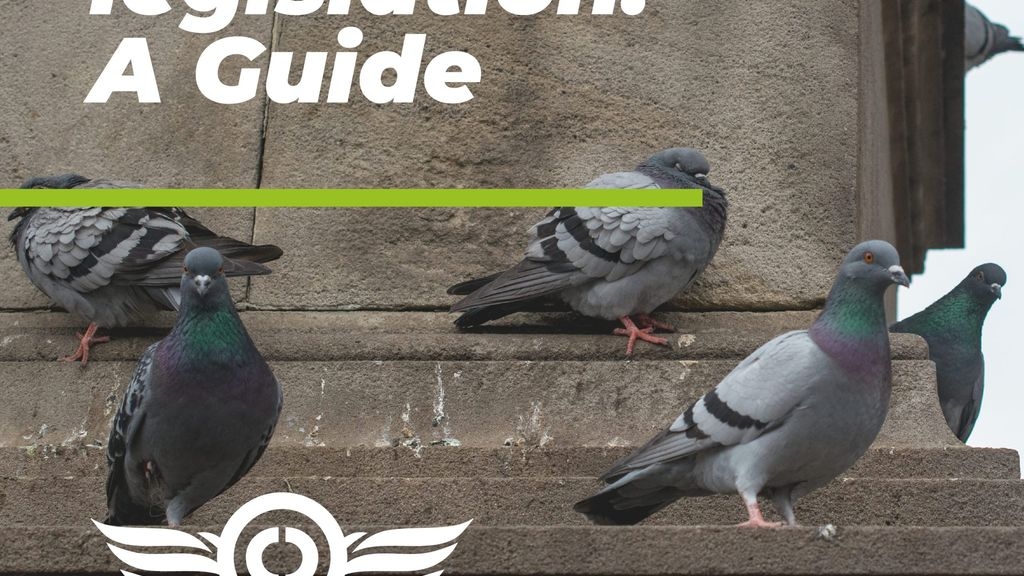Bird Control Legislation: A Guide

Bird Control Legislation: A Guide
If there are large numbers of birds like gulls, pigeons, and starlings congregating around your home or business, it can be more than a nuisance. They're a risk to health and they can cause considerable damage. Maybe you've thought about taking matters into your own hands. But before you do, you need to know the law on controlling birds and what it means for you.
ALL Wild Birds are Protected by Law
The Wildlife and Countryside Act 1981 makes it illegal to intentionally or recklessly injure or kill any bird or damage or destroy an active nest or its contents. Penalties for breaking the law can lead to an unlimited fine and prosecution.
Are There Any Circumstances in Which I Can Control Birds?
Yes. The law does recognise that there are some circumstances in which it may be necessary to control pest birds. These include;
Prevent serious damage to agriculture
Preventing the spread of disease
Preserving public health and safety and air safety
Conserving other wild birds
In circumstances where all non-lethal methods have failed.
Lethal Bird Control: Things to Note
Lethal bird control can be carried out only if you have an appropriate licence.
This can be a specific licence, which is usually granted on a case-by-case basis, or a general licence. Only an authorised person (often a landowner or pest control company) can carry out bird control under a general licence. It is unlikely that you'll be able to obtain a licence if birds are only a nuisance or have caused minor damage to your property.
Bird Control Licences: What You Need to Know
The general licence terms and conditions, and the species of bird they apply to, can vary depending on where you are in the UK. They can also be altered or withdrawn at any time. Our advice would be to check the latest terms and conditions before you think about bird control on your site. Taking actions that aren't currently permitted under licence can mean you're breaking the law.
General Licensing Changes
In recent years, there have been changes to what you can and can't do within the remit of a general license. Here's one example. Say that you have gulls nesting on your site. A few years ago, you could carry out eggs and nest removal under a general licence. This would eventually force the birds to go elsewhere. However, after a census showed declining gulls numbers, Natural England designated them as critically endangered. Now, you can only remove eggs and nests if you have a specific licence and you can show that you've tried everything else to get rid of the birds.
What Kind of Things Are Evidence That I've Taken Action?
Before you try any kind of lethal bird control, you have to show that you've tried everything to get rid of them, like:
Limiting food sources and access to anything that they can use to build nests
Removing old nests from previous breeding seasons (make sure they definitely aren't being used)
Bird-Proofing your building and blocking off entry points
Using appropriate bird deterrents
Bird proofing and deterrents are your first line of defence against pest birds. If they're successful, you may not need to resort to lethal control.
Need Help and Advice About Controlling Pest Birds?
If pest birds are causing problems on your premises, you can deal with them. But it's important to stay on the right side of the law.
Contego is known as one of the UK's leading specialist bird control companies and we have the knowledge and experience to help you legally control pest birds on your site.
We'll only use lethal control as a last resort and all of our bird control methods are legally-compliant and approved by legislative bodies like Natural England, Scottish Natural Heritage (SNH), Natural Resource Wales, and the Northern Ireland Department of the Environment.
Don't fall foul of the law when it comes to bird control. Protect your business and your reputation by calling in the professionals.
Need help now?
Defend yourself against pests with Contego
Don't wait until pests have invaded your premises, take action now and get in touch with Contego to safeguard your space from infestations. Our expert team is ready to assist you in defending yourself against pests, so contact us today for a comprehensive solution.


